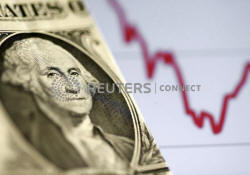Dollar slumps to two-month low, investors see more declines
 Send a link to a friend
Send a link to a friend
 [November 06, 2020] By
Ritvik Carvalho [November 06, 2020] By
Ritvik Carvalho
LONDON (Reuters) - The dollar sank to its
lowest level in over two months against a basket of peer currencies on
Friday, as vote counting for the contentious U.S. election dragged on
and investors predicted more losses for the currency.
Investors are betting that Democrat Joe Biden will become the next
president but Republicans will retain control of the Senate, which will
make it difficult for the Democrats to pass the larger fiscal spending
package they have been pushing.
Biden maintains an edge over President Donald Trump, but a few important
states are still counting votes and Trump is mounting legal challenges
to vote counts, so there is still a high degree of uncertainty.
The dollar index <=USD> fell against a basket of six major currencies to
92.274, hitting its lowest level since September 2.
Graphic: Dollar falls to 2-month low -
https://fingfx.thomsonreuters.com/
gfx/mkt/dgkvljrmwvb/USD.png

For the week, the dollar index was down 1.6%, on course for its biggest
drop in almost four months.
A large decline in long-term Treasury yields due to expectations for
less fiscal spending, combined with a rally in equities and other
riskier assets, has placed the dollar under consistent selling pressure
that is likely to continue.
"So far investors have been prepared to overlook the threat of a
contested election, presumably seeing Donald Trump’s legal initiatives
as ‘frivolous’ and these benign conditions have generated a broad-based
dollar decline," said strategists at ING.
"The fact that dollar/yen (which never moves) is trading at 103.50,
tells us that there is a broader dollar move afoot than a mere risk
rally."
The dollar fell further against the Japanese yen, trading at 103.23 yen
<JPY=D3> on Friday, close to an eight-month low.
Japanese Prime Minister Yoshihide Suga has vowed to work closely with
overseas authorities to keep currency moves stable, because a strong yen
is widely viewed as a threat to Japan's economy.
Against a buoyant euro <EUR=EBS>, the dollar traded at $1.1874 after
falling 0.87% in the previous session.
[to top of second column] |

A U.S. dollar note is seen in front of a stock graph in this
November 7, 2016 picture illustration. REUTERS/Dado Ruvic/Illustration/File
Photo

The single currency has risen sharply this week on the dollar's weakness, but
has also benefited from news of the European Union inching closer to a budget
deal.
The British pound <GBP=D3> traded at $1.3128, 0.2% lower on the day after a
hefty 1.23% gain on Thursday.
Voting tallies from several U.S. states continued to trickle in during Asian
trading hours, but currencies showed little reaction because the declaration of
an outright winner could take several more days or even weeks, some traders
said.
Investors were also awaiting the release of U.S. non-farm payrolls later on
Friday, forecast to show a slight slowdown in job creation.
Worries about the U.S. economy are growing, which is a reason to expect declines
in the dollar to continue into next year, some analysts say. The rise in new
coronavirus cases to record levels in several states could also curb economic
activity.
ING also added that the dollar sell-off may have a little more mileage today if
Biden formally secures 270 electoral college votes or if a softer-than-expected
October payrolls report suggests that the Fed will have to throw more liquidity
at the market.
The onshore yuan <CNY=CFXS> fell to 6.6386 per dollar but still remained close
to its more than two-year high reached on Thursday.
Many investors expect a Biden administration will slightly scale back Trump's
trade war with China, which should benefit the yuan.

Elsewhere, the Australian dollar <AUD=D3> fell against the greenback after the
country's central bank said it is prepared to expand bond purchases if needed to
support the economy.
(Reporting by Ritvik Carvalho; additional reporting by Stanley White in Tokyo;
Editing by Ana Nicolaci da Costa)
[© 2020 Thomson Reuters. All rights
reserved.] Copyright 2020 Reuters. All rights reserved. This material may not be published,
broadcast, rewritten or redistributed.
Thompson Reuters is solely responsible for this content. |